The Fantasies That Made Sense of a Senseless Year
In Depth
Illustration: Elena Scotti (Photos: Getty Images, Shutterstock)
There’s a feature of old Irish folktales, which is the notion of a land somewhat parallel to our own that belongs to a magical, beautiful, aristocratic, and frequently cold and remote people called the fae. It’s over the hill and around the bend, or in the vicinity of an ancient barrow, or across the ocean—somewhere just up yonder, out of reach. Time moves differently there; in one famous story, the bard hero Oisín marries and follows a faerie woman to the land of Tir na nÓg. When he returns home for a visit after what he thinks to be a few short years, he finds centuries have passed. He falls off his horse, and when he hits the ground, he’s transformed into an old man, his own time having suddenly, all at once, engulfed him.
I think of those old stories now, the sound of crickets pouring through my half-open window. At the end of every summer, their song reaches a crescendo before autumn takes hold and everything dies, or at least goes to ground. But there’s something uncanny about their symphony this year, because it seems impossible that the summer is already gone—it seems like summer never even happened, like we’re permanently suspended in March. But there are the crickets, loudly insisting that it’s October, marking the passage of a year eaten by coronavirus.
I have no idea what to do with the feelings that I have bottled up as tightly as possible over the last six months, in the interest of continuing to put one foot in front of the other and getting through this with my career intact and my household functioning. The sheer magnitude of the experience of this year is too much to get a solid grip on it at once. Instead, I’ve caught myself processing it indirectly: again and again, moving through the weirdly misshapen time of this cataclysmic, vertiginously weird year marked by illness, unrest, brutality, and disaster, I have found myself turning to the fantasy genre, steadily working my way through a pile of fat novels about outer space, about dragons, about transformation, about faeries, about doors opening onto alternative worlds, even as I struggled to read anything else.
This isn’t borne of an escapist impulse. Rather, as walls of our agreed-upon reality have melted around me, it’s simply that realism felt unreal, too limited, an artifact from a dead world. Fantasy novels are the only things that make sense anymore.
I would have been excited to receive the long-awaited second novel by Susana Clarke under any circumstances, but as it happened, it arrived like a well-timed messenger in a pulpy sword-and-sorcery doorstopper. It’s unexpectedly slim, considering that she’s best known as the author of the sprawling fantasy masterpiece Jonathan Strange and Mr. Norrell. It’s also unsettling: Piranesi is written in the first person, presented as a series of journal entries by a man who knows himself only as Piranesi, who inhabits an endless house full of enigmatic statues and an equally endless ocean. The house is the world, and the world is the house, and Piranesi remembers nothing else: “Outside the House there are only Celestial Objects: Sun, Moon and Stars,” our narrator tells us.
-

-

-

-

-

-

-

-

-

-

-

-

-

-

-

-

-

-

-

-

-

-

-

-

-

-

-

-

-

-

-

-

-

-

-

-

-

-

-

-








































